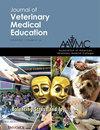Initial Validation of a Survey Instrument to Evaluate Veterinary Student Self-Efficacy for Antimicrobial Selection in the United States
IF 1.1
3区 农林科学
Q3 EDUCATION, SCIENTIFIC DISCIPLINES
引用次数: 0
Abstract
Antimicrobial resistance (AMR) is a major threat to human and animal health, and antimicrobial use selects for AMR. Appropriate selection of antimicrobial drugs is an important part of veterinary education, but many veterinary students report that they have knowledge gaps in this area. Students with greater self-efficacy, the belief that one can perform the individual steps that comprise a task, tend to expend more effort and motivation in learning new skills. Educational activities that improve self-efficacy can increase student motivation, but appropriate assessment tools tailored for specific educational domains are necessary to support these efforts. The purpose of this study was to validate an online survey instrument to measure veterinary student self-efficacy for antimicrobial selection. The secondary goal was to determine if clinical training increases veterinary students’ self-efficacy for antimicrobial selection. A total of 380 students from seven veterinary colleges in the United States completed an online survey instrument that asked students to self-assess their abilities to perform 13 tasks associated with antimicrobial selection on a 10-point Likert-type scale. A principal components analysis identified three factors associated with self-efficacy for antimicrobial selection: (a) empirical selection and dosing of antimicrobials, (b) identification of trustworthy resources and resistance to pressure to prescribe, and (c) knowledge of when antimicrobials are needed. Self-efficacy for antimicrobial selection increases the most in the fourth year of veterinary training. However, exposure to at least one clinical rotation was not associated with higher self-efficacy for selection of antimicrobials.美国兽医专业学生抗菌药物选择自我效能评估调查工具的初步验证
抗菌药耐药性(AMR)是人类和动物健康的一大威胁,而抗菌药的使用会选择性地产生 AMR。适当选择抗菌药物是兽医教育的重要组成部分,但许多兽医专业学生表示,他们在这方面存在知识缺口。自我效能感越高的学生,即相信自己能够完成某项任务的各个步骤的学生,在学习新技能时往往会花费更多的精力和动力。提高自我效能感的教育活动可以增强学生的学习动力,但需要针对特定教育领域量身定制适当的评估工具来支持这些努力。本研究的目的是验证一种在线调查工具,以衡量兽医专业学生在抗菌药物选择方面的自我效能。次要目标是确定临床培训是否能提高兽医专业学生在抗菌药物选择方面的自我效能。来自美国七所兽医学院的380名学生完成了一项在线调查,该调查要求学生用10分李克特量表对自己执行13项与抗菌素选择相关任务的能力进行自我评估。主成分分析确定了与抗菌药物选择自我效能相关的三个因素:(a) 经验性选择和抗菌药物剂量,(b) 识别值得信赖的资源和抵制处方压力,以及 (c) 了解何时需要使用抗菌药物。在兽医培训的第四年,选择抗菌药物的自我效能提高最快。然而,至少参加过一次临床轮转与抗菌药物选择自我效能的提高无关。
本文章由计算机程序翻译,如有差异,请以英文原文为准。
求助全文
约1分钟内获得全文
求助全文
来源期刊
CiteScore
2.20
自引率
30.00%
发文量
113
审稿时长
>36 weeks
期刊介绍:
The Journal of Veterinary Medical Education (JVME) is the peer-reviewed scholarly journal of the Association of American Veterinary Medical Colleges (AAVMC). As an internationally distributed journal, JVME provides a forum for the exchange of ideas, research, and discoveries about veterinary medical education. This exchange benefits veterinary faculty, students, and the veterinary profession as a whole by preparing veterinarians to better perform their professional activities and to meet the needs of society.
The journal’s areas of focus include best practices and educational methods in veterinary education; recruitment, training, and mentoring of students at all levels of education, including undergraduate, graduate, veterinary technology, and continuing education; clinical instruction and assessment; institutional policy; and other challenges and issues faced by veterinary educators domestically and internationally. Veterinary faculty of all countries are encouraged to participate as contributors, reviewers, and institutional representatives.

 求助内容:
求助内容: 应助结果提醒方式:
应助结果提醒方式:


